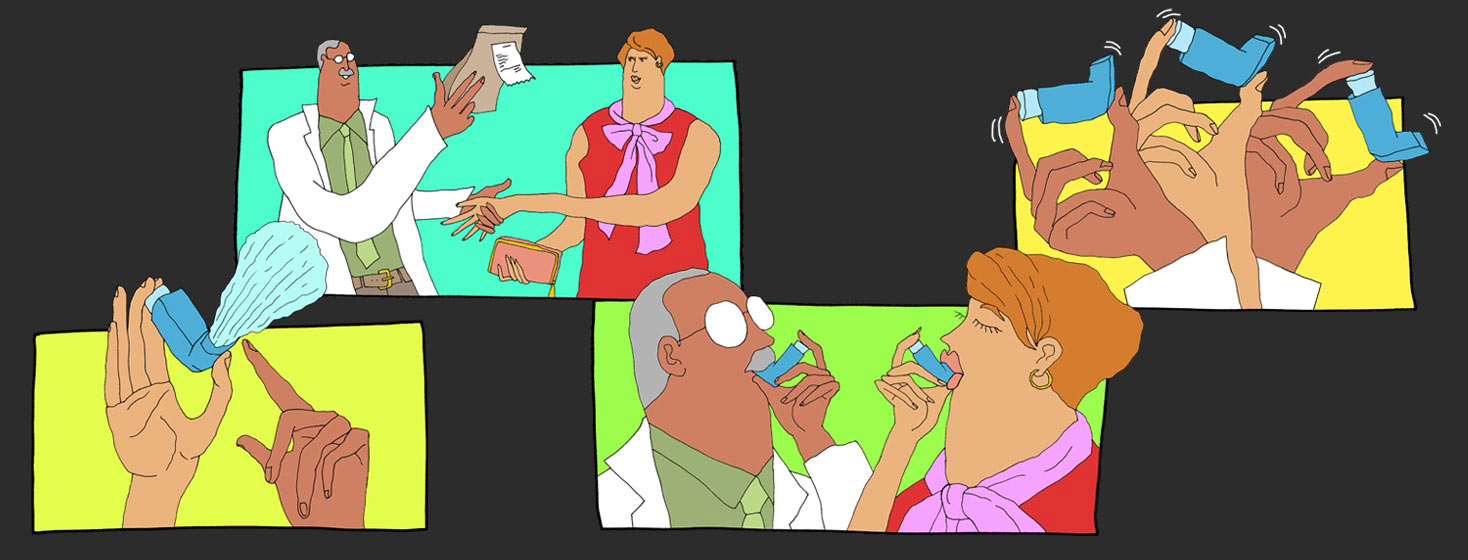How Pharmacists Can Help People With COPD
Managing a condition like chronic obstructive pulmonary disease (COPD) calls for an entire team. While you might first think of your doctors and nurses, your pharmacist can also be a vital part of your team.
Pharmacists have special training to help you manage and improve your health. They can be a good resource to help you manage your COPD drugs, stick to your treatment plan, offer tips to help improve your quality of life, and more.
Ensuring access to COPD drugs
Relieving symptoms
Pharmacists provide the drugs that doctors prescribe to relieve symptoms and prevent severe flare-ups of COPD. This includes drugs that lower inflammation and drugs that ease muscle tightness and open airways. Pharmacists also dispense antibiotics to clear up infections that threaten the health of people with COPD.1-2
Various forms
Drugs for COPD come in various forms. Your pharmacist can help you find what form works best for you. While some of the drugs are pills, many are breathed in through inhalers. Your pharmacist can explain the benefits and drawbacks of each one.1-2
Insurance and cost
Pharmacists do more than just fill prescriptions. They may also help with insurance issues, like how to get and make the most of your coverage. Your pharmacist can help you cut down on drug costs. In most cases, they can offer details on patient assistance programs, generic options, and drugs with lower co-pays.1
Instructions for using COPD devices and drugs
When and how
Along with providing drugs to treat COPD, pharmacists educate people on how and when to use them and why. Drugs may need to be taken at a certain time of day and with or without food. Some drugs bring instant relief from a flare-up, while others reduce symptoms little by little when used over a long span.1,2
As prescribed
Seeing that people use their drugs as directed is a key part of a pharmacist’s job. This is especially important with inhalers for COPD. Inhalers must be used a certain way to release the full dose of drugs into the lungs. Your pharmacist can teach you the proper steps for using your inhaler. They can also monitor how you do at the start of and throughout your treatment. If needed, your pharmacist can also offer you more training each time you come into the pharmacy.1,2
Drug review
Your pharmacist can also review all the drugs you take. This helps them advise on possible reactions and side effects you may experience. They can work with your doctor to make needed changes to the drugs you take. Your pharmacist may also suggest that you talk to your doctor about other treatments to enhance your quality of life, such as oxygen therapy.1,2
Pharmacist role
In 2016, a group of doctors wanted to see the effect of pharmacists who acted on behalf of people with COPD. The doctors looked at 10 studies conducted over the prior decade. They found that the pharmacists’ actions helped people with COPD stick to their drug course and use their inhalers the right way.3
Advice on non-drug treatments for COPD
More knowledge
Your pharmacist’s knowledge extends beyond their expertise in drugs. For instance, they may know how certain diseases, fitness, and/or nutrition may impact your condition. The pharmacist may suggest products and programs to help you quit smoking. They may also recommend vaccines for illnesses that affect breathing, such as flu and pneumonia.1,2
Personal care plan
Your pharmacist can work with your care team to help you create and carry out your own personal plan of care. This plan may outline triggers, symptoms to watch for, and treatment options.
Improving health
What pharmacists share can encourage people with COPD to take charge of their health. The knowledge helps them to make wise, informed decisions. People learn what they can do to improve their health and outcomes.
Progress
A 2021 study looked at a program used by community pharmacists. These pharmacists offered some of the insight and services mentioned above to several dozen people with COPD. The doctors leading the study found great worth in the program. The results showed progress with care plans, inhaler use, know-how, symptom control, and vaccine rates.2
Care beyond the pharmacy
Extra support
Treatments and training from pharmacists can help people with COPD, as well as their families and communities. Pharmacists can guide family members on how to help their loved ones stick to their treatment plans. Getting and keeping symptoms under control can prevent costly declines in health that often end in hospital stays. With the extra support, people with COPD can enjoy a better quality of life.1,2
Well-rounded team
Whether you have received a diagnosis of COPD this year or years ago, you do not have to bear the burden of managing this complex chronic illness on your own. A team that includes a well-informed pharmacist can greatly help you. Making the most of how your pharmacist can help you manage COPD is good for your health.
Do you have experience working with a pharmacist? Share your story by clicking the button below!

Join the conversation